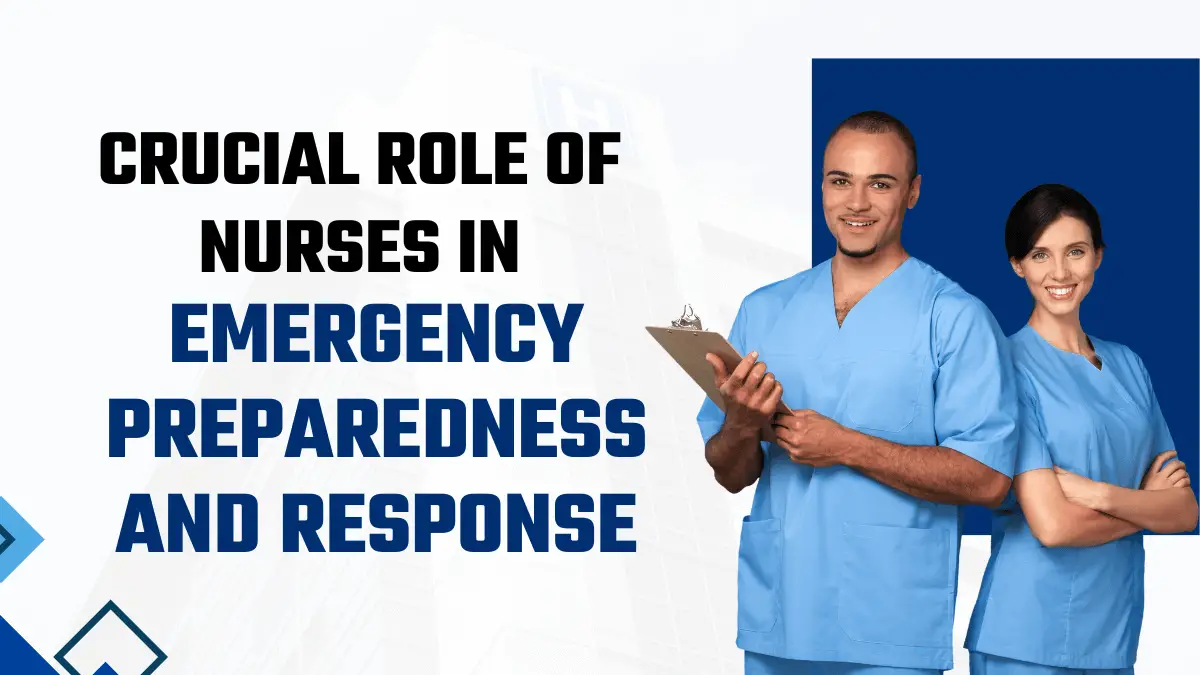In the realm of healthcare, the role of nurses in emergency preparedness and response cannot be overstated. Nurses are the backbone of the healthcare system, playing a pivotal role in ensuring that communities are adequately prepared for and effectively respond to emergencies of all kinds. From natural disasters to pandemics, nurses are at the forefront, providing essential care, support, and expertise. This comprehensive guide delves into the various aspects of the role of nurses in emergency preparedness and response, highlighting their invaluable contributions and the importance of recognizing and supporting their efforts.
Understanding Emergency Preparedness
Emergency preparedness refers to the proactive measures taken by individuals, communities, and organizations to mitigate the impact of potential emergencies and disasters. It involves planning, training, and resource allocation to ensure a timely and effective response when emergencies occur. Nurses play a critical role in every stage of emergency preparedness, from risk assessment and planning to implementation and evaluation.
Table: The Role of Nurses in Emergency Preparedness and Response
| Stage of Emergency Preparedness | Description |
|---|---|
| Risk Assessment and Planning | Nurses assess risks and vulnerabilities and develop comprehensive emergency response plans. |
| Training and Education | Nurses provide training and education to healthcare staff, first responders, and the community on disaster preparedness measures. |
| Resource Allocation | Nurses collaborate with local agencies to ensure healthcare facilities are equipped with necessary supplies and resources. |
| Implementation and Response | Nurses provide immediate medical care and support during emergencies, triaging patients and initiating life-saving interventions. |
| Evaluation and Continuous Improvement | Nurses participate in evaluations and debriefing sessions to assess the effectiveness of response efforts and identify areas for improvement. |
Risk Assessment and Planning
Nurses are trained to assess risks and vulnerabilities within communities and healthcare facilities. They work closely with other healthcare professionals, emergency management teams, and community leaders to identify potential hazards and develop comprehensive emergency response plans. These plans outline protocols for various scenarios, including natural disasters, infectious disease outbreaks, and mass casualty events.
Training and Education
One of the key roles of nurses in emergency preparedness is to provide training and education to healthcare staff, first responders, and the community at large. Nurses conduct drills and simulations to ensure that everyone understands their roles and responsibilities during emergencies. They also educate the public on disaster preparedness measures, such as evacuation procedures, emergency shelters, and first aid techniques.
Resource Allocation
Nurses are involved in resource allocation efforts to ensure that healthcare facilities are adequately equipped to handle emergencies. This includes stockpiling essential supplies, such as medical equipment, medications, and personal protective gear. Nurses also collaborate with local and regional agencies to coordinate the distribution of resources during large-scale emergencies.
Implementation and Response
During emergencies, nurses are on the front lines, providing immediate medical care and support to those in need. They triage patients, assess their needs, and initiate life-saving interventions. Nurses work tirelessly to stabilize patients and transport them to appropriate healthcare facilities for further treatment. They also provide emotional support to patients and their families during times of crisis.
Evaluation and Continuous Improvement
Following an emergency, nurses participate in debriefing sessions and evaluations to assess the effectiveness of the response efforts. They identify areas for improvement and make recommendations for strengthening emergency preparedness plans. By continuously evaluating and refining their practices, nurses ensure that healthcare systems are better prepared to handle future emergencies.
The Role of Nurses in Specific Emergency Situations
Nurses play a critical role in various types of emergencies, including natural disasters, infectious disease outbreaks, and mass casualty events. Here’s a closer look at their role in each scenario:
Natural Disasters
During natural disasters such as hurricanes, earthquakes, and floods, nurses provide essential medical care to affected individuals. They set up temporary medical shelters, treat injuries, and manage chronic health conditions. Nurses also assist with evacuation efforts and provide support to displaced individuals.
Infectious Disease Outbreaks
Infectious disease outbreaks, such as the COVID-19 pandemic, require a coordinated response from healthcare professionals, including nurses. Nurses are responsible for screening patients, administering vaccines, and implementing infection control measures to prevent the spread of disease. They also play a key role in educating the public about the importance of vaccination and hygiene practices.
Mass Casualty Events
In the event of a mass casualty event, such as a terrorist attack or transportation accident, nurses are instrumental in triaging and treating large numbers of patients. They work alongside other healthcare professionals to prioritize care based on the severity of injuries and available resources. Nurses also provide psychological first aid to survivors and their families, helping them cope with the trauma of the event.
The Importance of Collaboration and Interdisciplinary Approach
Effective emergency preparedness and response require collaboration and a multidisciplinary approach. Nurses work closely with physicians, emergency responders, public health officials, and community organizations to ensure a coordinated response to emergencies. By leveraging their unique skills and expertise, nurses contribute to the overall resilience and readiness of healthcare systems.
Conclusion
Nurses play a critical role in emergency preparedness and response, demonstrating unwavering dedication, compassion, and expertise in the face of adversity. From assessing risks and planning for emergencies to providing life-saving care and support during crises, nurses are indispensable members of the healthcare team. It is essential to recognize and support their contributions, ensuring that they have the resources and training needed to fulfill their vital role in protecting public health and safety.

